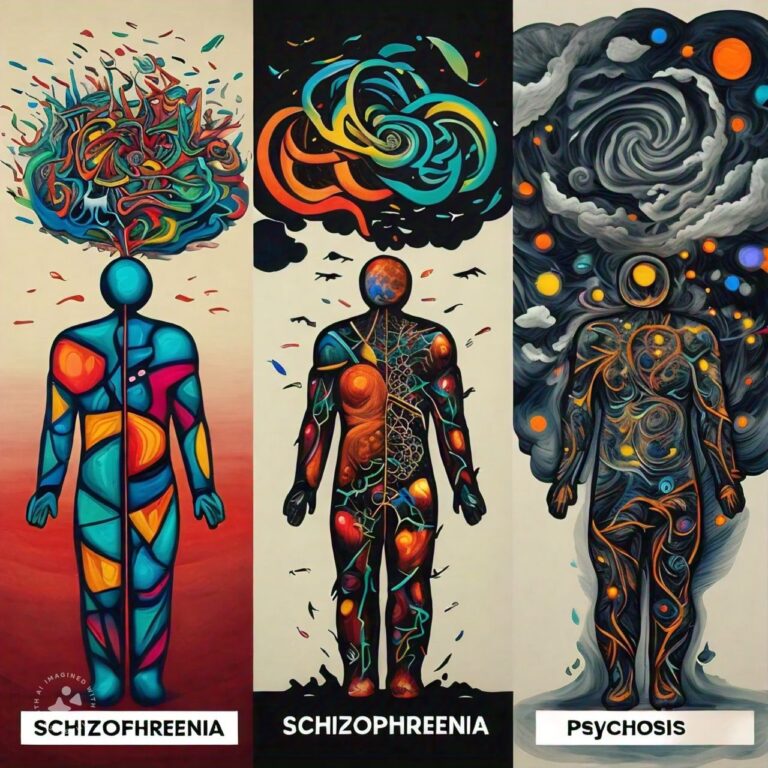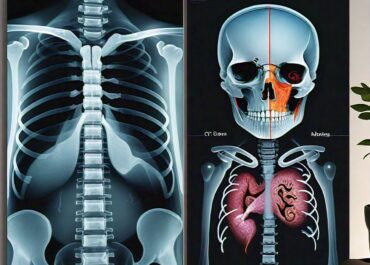
Differences Between Schizophrenia and Psychosis
Schizophrenia and psychosis are terms often used interchangeably, but they refer to different things. Schizophrenia is a chronic mental health disorder that affects how a person thinks, feels, and behaves. It is characterized by symptoms such as hallucinations, delusions, and disorganized thinking. Psychosis, on the other hand, is a symptom, not a diagnosis or disorder. It refers to a state where an individual experiences a loss of contact with reality, often manifested through hallucinations and delusions.
While psychosis can be a part of many mental health disorders, including schizophrenia, it can also be caused by other factors like drug use, severe stress, or medical conditions. Understanding the differences between schizophrenia, a long-term mental illness, and psychosis, a temporary state of mental disturbance, is crucial for diagnosing and treating mental health conditions effectively.
Schizophrenia Overview
Introduction to Schizophrenia
Schizophrenia is a chronic and severe mental health disorder that impacts a person’s ability to think clearly, manage emotions, make decisions, and relate to others. Schizophrenia affects about 1% of the population worldwide and typically manifests in late adolescence or early adulthood, though it can occur at any age.
Schizophrenia is often misunderstood due to the complex nature of its symptoms. People with schizophrenia may experience hallucinations (hearing or seeing things that are not there), delusions (strong beliefs that are not based in reality), disorganized thinking, and severely impaired functioning. These symptoms can lead to difficulties in maintaining relationships, holding a job, or performing daily tasks.
Despite popular misconceptions, schizophrenia does not mean having a "split personality" or multiple personalities. Instead, it refers to disruptions in thought processes, perception, and emotions, which can make it hard for a person to differentiate between reality and their own internal experiences.
Symptoms of Schizophrenia
The symptoms of schizophrenia are categorized into three main types: positive symptoms, negative symptoms, and cognitive symptoms.
- Positive Symptoms: These refer to behaviors or experiences that are added to a person’s normal functioning and are usually the most obvious signs of schizophrenia. Positive symptoms include:
- Hallucinations: Hearing voices, seeing things, or sensing things that are not present.
- Delusions: Strongly held false beliefs that are not based on reality, such as believing one has extraordinary powers or is being persecuted.
- Disorganized Thinking: Trouble organizing thoughts or connecting them logically, often resulting in incoherent speech.
- Disorganized Behavior: Unpredictable or inappropriate behaviors, such as talking to oneself, neglecting personal hygiene, or exhibiting strange body postures.
- Negative Symptoms: These involve a reduction or loss of normal functioning. Negative symptoms include:
- Apathy: Lack of interest or motivation to engage in everyday activities.
- Flat Affect: Reduced expression of emotions, such as showing little or no facial expression.
- Social Withdrawal: Avoiding social interactions and preferring isolation.
- Anhedonia: Inability to feel pleasure from activities that are typically enjoyable.
- Cognitive Symptoms: These symptoms affect memory, attention, and executive functioning. They include:
- Poor Concentration: Difficulty focusing or paying attention.
- Impaired Memory: Trouble remembering things or processing information.
- Difficulty with Decision Making: Struggling to make decisions or plan for the future.
Causes of Schizophrenia
The exact cause of schizophrenia is not fully understood, but it is believed to result from a combination of genetic, biological, and environmental factors:
- Genetics: Schizophrenia tends to run in families, indicating that there may be a genetic component. However, no single gene is responsible for the disorder, and it is thought to be caused by multiple genetic variations.
- Brain Chemistry and Structure: Abnormal levels of neurotransmitters, such as dopamine and glutamate, are thought to play a role in schizophrenia. Additionally, some people with schizophrenia have structural abnormalities in their brains, such as enlarged ventricles or reduced gray matter.
- Environmental Factors: Stress, trauma, prenatal exposure to infections or malnutrition, and drug abuse (especially cannabis, LSD, or amphetamines) may trigger or exacerbate the symptoms of schizophrenia, particularly in individuals with a genetic predisposition.
Diagnosis and Treatment of Schizophrenia
Diagnosing schizophrenia can be challenging, as its symptoms overlap with those of other mental health disorders. A diagnosis is typically made based on a comprehensive evaluation, including a clinical interview, observation, medical history, and ruling out other potential causes of symptoms (e.g., substance abuse or medical conditions).
Treatment for schizophrenia focuses on managing symptoms, as there is no cure for the disorder. Common treatments include:
- Antipsychotic Medications: These are the cornerstone of treatment for schizophrenia. They help reduce the intensity of psychotic symptoms such as hallucinations and delusions. Common antipsychotic drugs include risperidone, olanzapine, and clozapine.
- Psychotherapy: Cognitive Behavioral Therapy (CBT) can help individuals with schizophrenia manage their symptoms by addressing distorted thinking and learning coping strategies.
- Supportive Therapy: Vocational training, social skills training, and family therapy can help individuals with schizophrenia improve their functioning and quality of life.
- Hospitalization: In cases of severe symptoms or when a person poses a risk to themselves or others, hospitalization may be necessary to stabilize the individual.
Living with Schizophrenia
Schizophrenia is a lifelong condition, but with proper treatment, many individuals can lead fulfilling lives. Treatment adherence is crucial, as stopping medication can lead to relapses or worsening of symptoms. Support from family, friends, and healthcare providers can greatly improve the prognosis for those living with schizophrenia.
Psychosis Overview
Introduction to Psychosis
Psychosis refers to a symptom or a state in which a person loses touch with reality. It is not a diagnosis in itself but rather a feature of several mental health disorders. People experiencing psychosis may have trouble distinguishing between what is real and what is not, leading to hallucinations, delusions, and severely distorted thinking. Psychosis can occur in the context of mental illnesses like schizophrenia, bipolar disorder, and major depressive disorder, but it can also result from other factors such as substance abuse, sleep deprivation, or medical conditions.
Psychosis can be a temporary or chronic condition depending on its underlying cause. Some people may only experience one episode of psychosis in their lifetime, while others may have recurring episodes as part of a long-term mental health disorder.
Symptoms of Psychosis
Psychosis is characterized by a range of symptoms that indicate a disconnection from reality. The most common symptoms include:
- Hallucinations: Hallucinations involve perceiving things that are not present. People may hear voices, see things, or feel sensations that have no external source.
- Delusions: Delusions are false beliefs that are strongly held despite clear evidence to the contrary. For example, someone experiencing psychosis might believe that they are being followed or that they have special powers.
- Disorganized Thinking and Speech: During psychosis, thoughts can become jumbled and difficult to follow. This disorganized thinking often results in incoherent speech, known as “word salad,” where a person speaks in a nonsensical manner.
- Cognitive Difficulties: Psychosis can impair cognitive functions such as attention, memory, and decision-making.
- Behavioral Changes: People experiencing psychosis may exhibit unusual behaviors, such as paranoia, agitation, or erratic actions. They may also have difficulty completing everyday tasks.
Causes of Psychosis
Psychosis can result from a variety of causes, and understanding the underlying cause is essential for effective treatment. Common causes of psychosis include:
- Mental Health Disorders: Psychosis is a hallmark symptom of certain mental health disorders, including schizophrenia, bipolar disorder, schizoaffective disorder, and severe depression.
- Substance-Induced Psychosis: The use of drugs such as LSD, methamphetamine, or cannabis can trigger psychosis, especially in high doses or with prolonged use. Withdrawal from substances like alcohol or benzodiazepines can also lead to psychotic episodes.
- Medical Conditions: Certain medical conditions, such as brain tumors, infections, neurological disorders, or autoimmune diseases, can cause psychosis. Conditions such as dementia or Alzheimer’s disease can also lead to psychotic symptoms.
- Extreme Stress or Trauma: In rare cases, extreme stress, sleep deprivation, or a traumatic event can induce a brief psychotic episode, often referred to as brief reactive psychosis.
Diagnosis and Treatment of Psychosis
Diagnosing psychosis involves identifying the underlying cause and ruling out other medical conditions. A healthcare provider will assess the person’s symptoms, medical history, and current medications. Laboratory tests or brain imaging may be conducted to identify any potential medical causes.
Treatment for psychosis typically involves a combination of medication, therapy, and support. The specific treatment will depend on the cause of the psychosis:
- Antipsychotic Medications: These are often used to control symptoms of psychosis, such as hallucinations and delusions. Medications such as haloperidol, aripiprazole, and quetiapine are commonly prescribed.
- Cognitive Behavioral Therapy (CBT): CBT can help individuals with psychosis challenge their delusional thinking and develop coping strategies to manage their symptoms.
- Hospitalization: In cases where psychosis is severe and poses a risk to the individual or others, hospitalization may be necessary to ensure safety and provide intensive treatment.
- Treating Underlying Causes: If psychosis is caused by a medical condition or substance use, treating the underlying issue is crucial for resolving psychotic symptoms.
Prognosis for Psychosis
The outlook for psychosis depends on its cause. For some people, psychosis may be a one-time event that resolves with treatment, while others may experience recurring episodes, especially if the psychosis is part of a chronic condition like schizophrenia or bipolar disorder. Early intervention and ongoing treatment can significantly improve outcomes.
Differences Between Schizophrenia and Psychosis
- Definition:
- Schizophrenia: A chronic mental health disorder characterized by recurring episodes of psychosis and other symptoms such as disorganized thinking and negative symptoms.
- Psychosis: A symptom that refers to a temporary state of losing contact with reality, which can occur in several mental health conditions, substance abuse, or medical issues.
- Duration:
- Schizophrenia: Schizophrenia is a long-term condition that requires ongoing management.
- Psychosis: Psychosis can be a short-term or recurring symptom, depending on the cause.
- Cause:
- Schizophrenia: Schizophrenia has a specific diagnosis and is caused by a combination of genetic, neurobiological, and environmental factors.
- Psychosis: Psychosis can be caused by a variety of factors, including mental illness, substance use, trauma, or medical conditions.
- Symptoms:
- Schizophrenia: Includes positive symptoms (hallucinations, delusions), negative symptoms (lack of motivation, flat affect), and cognitive symptoms (memory issues, poor decision-making).
- Psychosis: Primarily involves hallucinations, delusions, and disorganized thinking.
- Treatment:
- Schizophrenia: Requires long-term treatment with antipsychotic medications, therapy, and support.
- Psychosis: Treatment depends on the underlying cause and may involve antipsychotic medications, therapy, or treating the root cause (e.g., stopping drug use).
- Onset:
- Schizophrenia: Usually develops in late adolescence or early adulthood and tends to be a lifelong condition.
- Psychosis: Can develop suddenly in response to stress, drugs, or medical conditions and may be temporary.
- Course:
- Schizophrenia: Symptoms tend to be chronic, with periods of remission and relapse.
- Psychosis: Can be a one-time event or occur intermittently, depending on the underlying cause.
- Cognitive Impact:
- Schizophrenia: Often includes cognitive impairments, such as difficulty concentrating or making decisions.
- Psychosis: May or may not involve cognitive symptoms, depending on the cause.
- Functioning:
- Schizophrenia: Long-term schizophrenia can impair a person's ability to function in daily life, affecting work, relationships, and personal care.
- Psychosis: Depending on the severity and duration, psychosis can temporarily impair functioning, but recovery is possible if the underlying cause is treated.
- Outlook:
- Schizophrenia: While it is a lifelong condition, proper treatment can improve symptoms and quality of life.
- Psychosis: The prognosis depends on the cause—psychosis due to substance use or medical conditions may resolve fully once the underlying issue is treated.
Conclusion
Schizophrenia and psychosis are related but distinct terms in the field of mental health. Schizophrenia is a chronic mental illness that affects a person's thoughts, emotions, and behaviors, characterized by recurring episodes of psychosis along with other symptoms like disorganized thinking and social withdrawal. Psychosis, on the other hand, is a symptom where a person loses touch with reality, experiencing hallucinations or delusions. It can occur as part of various mental health disorders, substance abuse, or medical conditions.
Understanding the difference between schizophrenia and psychosis is important for providing the correct diagnosis and treatment. Schizophrenia requires long-term management, while psychosis may be a one-time event or occur in the context of another condition. With proper treatment, many individuals with schizophrenia or psychosis can lead fulfilling lives, but early diagnosis and ongoing care are crucial for improving outcomes.
FAQs
Related Topics
- All
- Animals
- Diseases
- Health
- Money
- Politics
© 2024 OnYelp.com. All rights reserved. Terms and Conditions | Contact Us | About us





